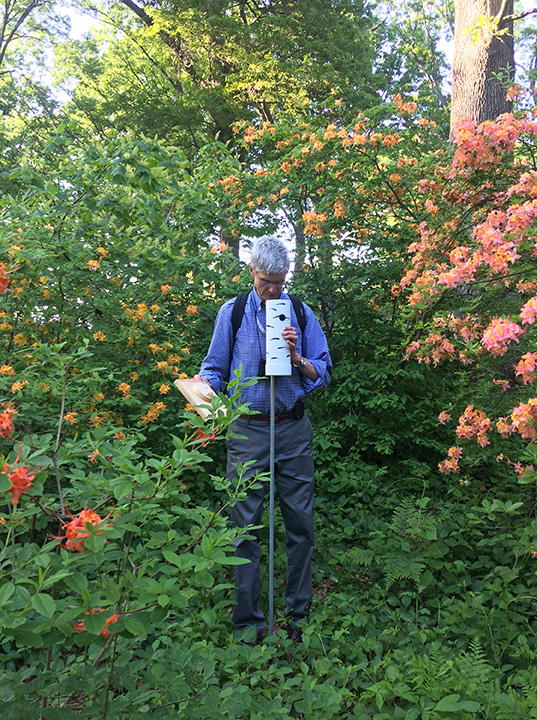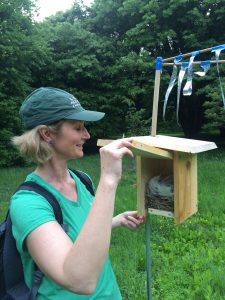This spring, the Arboretum’s Visitor Engagement department launched our inaugural “Arboretum NestWatch” volunteer program. Since then, our small group of trained volunteers have been diligently monitoring the 30 nest boxes located on our grounds and submitting their observations to the Cornell Lab of Ornithology’s NestWatch project, a citizen science initiative that uses data gathered from across the country to study bird behavior. As a NestWatch chapter organization, the Arboretum is committed to furthering the study of birds our on grounds as well as engaging and educating the public on the amazing lives of our urban species.

Our Arboretum NestWatch program has several goals, the primary one being to gain insight on the birds that call the Arboretum home. Regularly monitoring nest boxes allows our volunteers to collect data such as when different species arrive in Boston, when they begin building nests, when they lay eggs, and when the young hatch and fledge. Since only cavity nesting birds use nest boxes, volunteers mostly observe species such as tree swallows, eastern bluebirds, black capped chickadees, and house wrens.
One the human side, our goal is to increase educational opportunities for the public. Monthly bird walks, Tree Mobs, and blogposts such as this serve to highlight birds in the landscape. Our Arboretum NestWatch volunteers get a more in-depth experience. Trained by staff, they learned how to identify common species of cavity nesting birds, how to safely observe and monitor adults and young, and how accurately report their observations to the Cornell Lab of Ornithology. Since they monitor their assigned nest boxes every 3-4 days, each volunteer has also seen the stages of the breeding cycle change before their eyes.
Since bird breeding behavior is closely linked with seasonal cues that trigger insect emergence, and insect emergence follows plant growth, accurate data can be used to track larger environmental trends, such as climate change. This is why we submit all of our records to the Cornell Lab of Ornithology, which collates data submitted from across the country to analyze bird behavior and the many factors that influence it. Every observation is important!

By any measure, our inaugural year of “Arboretum NestWatch” has been a success. Some highlights include the completely occupied nestboxes on Peter’s Hill slope, three of housing tree swallows and one providing home to a pair of eastern bluebirds, their first documented nest at the Arboretum since 2005. According to NestWatch, our volunteers also submit data on four out of the total thirty-two black-capped chickadee nests in Massachusetts. Regular monitoring has also prevented any nest boxes from being taken over by house sparrows and so far, almost all of the eggs have hatched new nestlings in varying states of growth.
Although the current nesting season is rapidly coming to a close, we plan to continue our Arboretum NestWatch program next spring. If you are interested in joining, keep an eye on our calendar for training dates. For those interested in learning more about birds and how to ID them, sign for our last spring bird walk (to be resumed in the fall). And as always, keep an eye on our social media accounts and blog for photos and information about life on the grounds.
